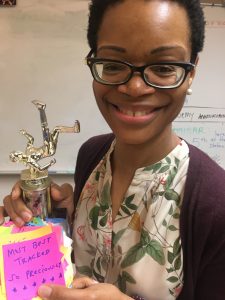KALW Audio Academy Works at Documenting Current News and Keeping the Record Straight
By Ben Trefny, News Director, KALW, audience supported public media; and Precious Green, Audio Academy ’20 Fellow
We’re approaching graduation day for the Audio Academy class of 2020. It’s been the most unexpected and extraordinary last trimester. What can you say?!
One thing is that this class has been KALW‘s most productive yet. We made the choice at the beginning to teach our students how to make spots — one-minute stories — that could enhance our station’s immediate news coverage. By March, when the coronavirus crisis transformed the Bay Area, our team was seasoned and ready to step it up even further. While they’ve been making impactful features, contributing to our person-on-the-street series The Quarantine Diaries, and helping behind-the-scenes with our news operations, each fellow has been reporting a news spot every week. Most all have well over 20 broadcast credits, now, and of course they keep getting better and better. Here are a few examples from this week:
• Victor Tence — London breed Closes the Gap on San Francisco’s Budget Deficit
• Precious Green — Peaceful Oakland Protest Marred by OPD Response
• Imran Ali Malik — Protesters Arrested Outside of San Francisco City Hall of Justice
While KALW has been covering the regional news of the day more thoroughly than ever before, this week’s content on Crosscurrents has been a great reflection of our department’s ability to go in depth:
Day By Day: The Quarantine Diaries Ep. 11 — Combining protests with COVID-19 issues, focused on perspectives of people of color, tremendously emotional, and titled “Who Gets To Be Safe?”
At Mass Demonstrations, Protesters Weigh the Risks of COVID-19 — Powerful, timely story set in SF’s Mission District by KALW’s Immigration Reporter and Audio Academy mentor Teresa Cotsirilos
Kaepernick: Race, Protest and Respect — An updated documentary about the impact Colin Kaepernick‘s protests against police brutality had on the nation, his own career, youth, and incarcerated people, with reporting from Boawen Wang (’17) and Jeremy Jue (’17)
Peaceful Protest Puts Los Gatos on Edge, Unveils Underlying Racial Tensions — Our most popular story in weeks, with a quick turnaround by Los Gatos resident and Audio Academy fellow Sarah Lai Stirland
I asked Sarah’s regular Tuesday Academy partner Precious Green for some thoughts on reporting during these traumatic times. Here’s what she has to say:
When I first started writing this, my focus was on how sheltering-in-place and COVID-19 had upended my Audio Academy experience. That feels so long ago.
Before COVID, I spent my Tuesdays at KALW in San Francisco. They were fairly structured days, guided by the newsroom needs and my assigned tasks. And they were fun. KALW’s news crew is made up of so many fascinating people who shared random stories of wild reporting escapades, surfing, getting tape in a crunch, and Burning Man. We bonded over Chocolate O’Clock and the daily Post-It trophy presentation. And we worked together each day as a team, crafting news features and stories to share with the world. March 10th was my last day there.
In the weeks since, we all shifted, creating home studios in walk-in closets or out of blankets, pillows, and chairs. The news crew ramped up its coverage and that meant many more opportunities for me and the other Academy fellows. But I struggled to take advantage. COVID-19 took people I loved and triggered anxiety that I may never fully process. Thankfully, I was able to make a short news spot each week. The staff has been incredibly generous and kind. But I was weary.
And then, it was deja vu all over again. First, the country learned of the killing of Ahmaud Arbery in my home state. Then, Breonna Taylor. Then, the Christian Cooper black birder video. And then George Floyd. The succession of violence has left me reeling and struggling with a sense of hopelessness, anger, distrust, and fear.
I don’t want to feel helpless or cynical. But, how should I respond to the one-two punch of a viral pandemic and systemic racial violence?
“This is precisely the time when artists go to work. There is no time for despair, no place for self-pity, no need for silence, no room for fear. We speak, we write, we do language. That is how civilizations heal.” — Toni Morrison
Ms. Morrison’s quote focused on artists, but the truth is this is precisely the time for journalists, even “baby journos” like me, to go to work. We have an opportunity and a responsibility to tell the stories of this moment simply, accurately, and completely.
“We speak, we write, we do language.”
I recently shared the story of one of Oakland’s peaceful protests with our listeners and I am thinking of new features that will tell the story of this season.
“That is how civilizations heal.”
This is an unprecedented moment of disruption and change. Thanks to our Audio Academy training, my colleagues and I are able to document what is happening and help to keep the record straight. Our new normal will be set by what we remember and what we learn.

